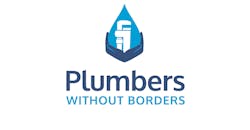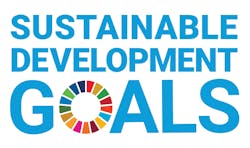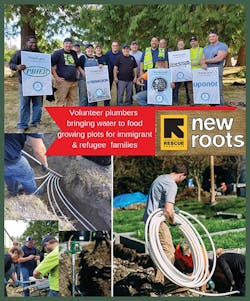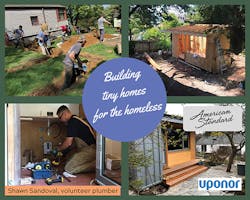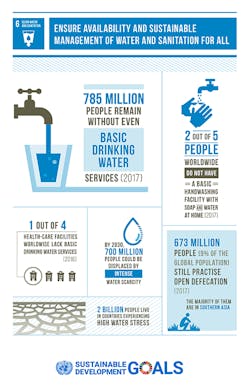Providing a Basic Human Right
In the United States, most of us take our potable water supply for granted. We have safe water to drink and cook with, as well as readily available hot water to bathe in. We have professional, licensed plumbing professionals to design, install and repair our plumbing systems—and ensure our health and safety.
Yet more than 2 million Americans live without running water and basic plumbing, notes “Closing the Water Access Gap in the United States,” a new report by the human-rights nonprofit DigDeep and the nonprofit U.S. Water Alliance.
“While the majority of Americans take high-quality drinking water and sanitation access for granted, millions of the most vulnerable people in the country … have fallen through the cracks,” the report says. “Their communities did not receive adequate water and wastewater infrastructure when the nation made historic investments in these systems in past decades. That initial lack of investment created a hidden water and sanitation crisis that continues to threaten the health and wellbeing of millions of people today.”
Globally, 2.4 billion people lack access to essential sanitation services such as toilets and latrines, the United Nations notes. One of its 17 sustainable goals for the planet is clean water and sanitation (www.un.org/sustainabledevelopment/water-and-sanitation/). While the proportion of the global population using an improved drinking water source has increased from 76 percent in 1990 to 90 percent in 2015, there is still much work to be done:
• Water scarcity affects more than 40 percent of the global population and is projected to rise.
• More than 80 percent of wastewater resulting from human activities is discharged into rivers or sea without any pollution removal.
• Each day, nearly 1,000 children die due to preventable water and sanitation-related diarrheal diseases.
A Need to Serve
So what can the plumbing community do to help? That was the question asked by certified plumber Domenico DiGregorio; his wife, Carmela DiGregorio; certified plumber Fred Volkers; and his wife, Judy Volkers. After the horrifying 2010 earthquake in Haiti, and watching as the global plumbing community came to the country’s aid, the two retired Seattle plumbers committed themselves to facilitate plumbing and sanitation projects for communities in need—wherever they may be.
Thus, Plumbers Without Borders (www.plumberswithoutborders.org) was born, its mission to “connect and mobilize volunteer plumbers and industry resources with organizations and projects dedicated to safe water and sanitation.” Domenico DiGregorio serves as the nonprofit organization’s president and board chair; Fred Volkers serves as vice president and vice chairman of the board; Carmela DiGregorio is the executive director; and Judy Volkers, a registered nurse, serves on the board.
Filling out the board is Florida certified master plumber Fred C. Schilling Jr., who is also a PWB vice president and vice chairman; Seattle broadcast personality Allen Schauffler; and Seattle attorney Monica Langfeldt.
“While the idea to create Plumbers Without Borders came somewhat naturally, the implementation was more challenging,” Domenico DiGregorio explains. “We started with minimal personal funds and continued to self-fund our efforts for several years.”
Once established, the founders turned to their plumbing industry contacts to spread the word about PWB. “As our volunteer database began to grow, we successfully connected several volunteer PHCC and Local 32 plumbing contractors with Habitat for Humanity-Seattle projects that included fully replumbing 11 homes in economically hard-hit areas, during the housing crash rebound of 2012,” Domenico DiGregorio says.
As more plumbers were willing to volunteer their services to help needy communities, the challenge to the PWB board was finding organizations seeking out plumbers to help them.
“Before Plumbers Without Borders, there wasn’t a conduit or network for plumbers to easily offer their time and skills towards a project,” Domenico DiGregorio explains. “While the idea of a ‘volunteer plumber’ sounded great, charities that were running projects involving water, sanitation and plumbing weren’t accustomed to seeking or finding volunteer plumbers.”
A decade later, PWB now receives more aid requests from those organizations as they see the benefit of having professional plumbers involved in their projects.
“They’ve come to realize the tremendous value plumbers bring and that there are indeed thousands of available plumbers around the world who truly wish to serve others,” he says. “As we also have access to many plumbing engineers in our database, we encourage project managing organizations to request planning and design help at the earliest stages of the project, so we can connect them with willing professionals who can offer consulting services pro-bono from planning to completion.”
The organization uses various methods to connect volunteer plumbers to drinking water/sanitation projects:
• Search the web for potential projects and organizations that initiate and manage safe water and sanitation projects. “We invite them to consider the advantages of engaging professional plumbers in their projects, and then connect these organizations with potential volunteers, after pinning down their project scope and other criteria,” Carmela DiGregorio notes.
• Publish requests for projects as well as for volunteers through its website, social media and newsletters.
• Link volunteers with projects through a series of emails and phone conferencing, with PWB being the facilitator and liaison between the managing organization and the volunteer.
• Connect volunteers with organizations such as Engineers Without Borders, Build Health International, Habitat for Humanity, Construction for Change and other nongovernmental organizations that register on the PWB website to post their project descriptions and volunteer opportunities.
“Sometimes, organizations find us on their own and register their project on our website, which we review and publish if it’s a good fit for our mission and capacity to successfully execute,” she adds.
The Power of Partnerships
To accomplish the organization’s vision of “a world where everyone has access to safe water and sanitation—where senseless suffering and disease is eradicated by the implementation of appropriate plumbing and sanitary systems,” connections and partnerships are crucial.
“The collective desire to serve others in need and be a part of creating the change that’s needed in the world is like a force of nature—it’s self-propelling,” Carmela DiGregorio notes. “Thankfully, our peers and our industry’s leaders have supported our efforts with sponsorship donations as well as in-kind plumbing materials and fixtures donated directly to the projects.”
American Standard Brands was the first corporate sponsor of Plumbers Without Borders six years ago and is still its staunchest supporter, she says, helping to launch and develop the volunteer database. That support continues with donations of fixtures for several PWB-related projects, including hospitals in Haiti, an outreach center in Flint and tiny homes for the homeless in Seattle.
Most recently, one of PWB’s newest sponsors, Zurn Industries, donated 140 toilets for new hospitals to be built in Haiti by Boston-based Build Health International, a PWB connection.
PWB coordinated several community projects with the help of UA Local 32 members in Seattle, Domenico DiGregorio says, as well as UA Local 12 in Boston, which recently facilitated a large donation of fixtures from mechanical engineering contractor EM Duggan to support Build Health International projects.
“A great example of the power of partnerships from start to finish was a recent project initiated and managed by Engineers Without Borders–NYC Professional Chapter,” she says. The project involved building a rainwater harvesting and distribution system in Kenya, alongside a team of local Kenyan village leaders and their community’s self-help group.
EWB-NYC contacted PWB seeking a volunteer plumber who could work with the engineers throughout all the stages of the project: planning, design, fundraising, implementing, completion and status follow-up with recipient residents. After PWB announced the opportunity, EWB-NYC chose retired plumber Jeff Morgan, founder of Grandview, Mo.-based Morgan Miller Plumbing.
“Jeff jumped in feet-first to quickly begin helping the engineering team with design planning, fundraising, social media and communications with other team members in Kenya,” she says. Morgan, a PWB advisory board member, also organized a community fundraiser hosted by Morgan Miller Plumbing, inviting customers, vendors, friends and family.
“We believe there’s a real thirst in our industry to show how plumbers contribute to the health of our world,” Morgan says. “If we can make this happen by helping bring resources, projects and volunteers together, there is no better way to give back.”
Mentoring the Next Generation
Aside from its philanthropic mission, Plumbers Without Borders is conscious of the skilled labor crisis in the construction trades and is doing its part to demonstrate how the plumbing industry can provide a rewarding and lucrative career for young people.
“PWB reaches out in various ways, including presenting at local schools or events and social media to inform young people about the many aspects and technologies involved in today’s plumbing and heating systems, wastewater treatment and infrastructure opportunities,” Schilling says. “When young career-seekers learn more about how plumbing changes lives, they’re amazed and thrilled to know they can ‘learn and earn’ while attaining skills that have the potential to impact lives so positively.”
The organization also reaches out to women, he adds, by highlighting inspiring women working in the trades and the plumbing industry. And PWB seeks the guidance and insight of women leaders to help advocate for closing both the skills and gender gaps.
PWB partners with industry leaders intent on creating a purpose-driven and socially responsible culture in the market and workplace. “We’ve heard a resounding desire from young people who want more than a good-paying job; they want to work for socially and environmentally forward-thinking companies to make products or perform services that make life better for everyone,” Carmela DiGregorio explains.
Domenico DiGregorio says one of the efforts of the engineering community could be replicated in the plumbing industry: Engineers Without Borders (www.ewb-usa.org) developed a network of more than 300 student chapters across the United States since its founding almost two decades ago.
“We believe there’s great potential for creating similar kinds of chapters within the plumbing community and, together with all the building and construction-related disciplines, every tradesperson and industry professional can join in helping reach the sustainable development global goals,” he says.
[Sidebar #1]
Connecting with Plumbers Without Borders
• Website: www.plumberswithoutborders.org
• Facebook: facebook.com/plumberswithoutborders
• Instagram: plumbers_without_borders
• Linkedin: www.linkedin.com/company/plumbers-without-borders/
• Twitter: plumbing4all
• Phone: 206/390-5000
Notable Projects
• A Seattle project involved six Plumbers Without Borders sponsors and partners: UA Local 32 members donated their time and skills; Prier Products donated the yard hydrants; Uponor donated the PEX piping; Linescape LLC donated time and equipment to do below-ground earth drilling; Ferguson provided discounted pricing; and American Standard provided general sponsor support.
The result was a community food garden supporting local refugee and immigrant families, managed by the International Rescue Committee.
• A call for help came from the B-Light Restoration Center in Flint, Mich., a community revitalization project offering shelter, counseling and other outreach services to many in the community who find themselves in survival mode or other unfortunate life events.
PWB contacted UA Local 370 in Flint, which coordinated several volunteer plumbers and apprentices to lend their time and skills to install the rough-in plumbing for four bathrooms and a commercial kitchen. PWB’s sponsoring partners, American Standard and Fisher Manufacturing, donated their highest-quality commercial fixtures and faucets to the building.
• The dedicated efforts of UA Local 32 volunteer plumber Shawn Sandoval, a project superintendent at Bellevue, Wash.-based Holmberg Mechanical, as well as sponsors donating materials and fixtures, helped bring the Seattle Block Project—building tiny homes for the homeless, in collaboration with local residents, who give the use of their available yard space—to fruition.
American Standard donated its highest quality fixtures, enough to outfit the next 10 homes, while Uponor donated the PEX piping materials and fittings.
